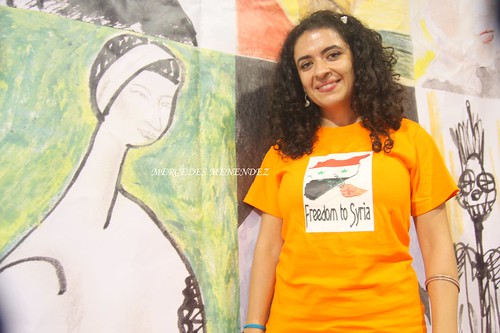Uprising in Spain and Syria: Interview with Leila Nachawati
Guestpost by David Sasaki
Spanish-Syrian activist and journalist, Leila Nachawati, has found herself at the center of the largest protest movements in recent years in both countries. As a veteran social media strategist — and a fluent speaker of Spanish, Arabic, and English — Leila has a unique perspective of the events unfolding in Spain and Syria, and their causes. She will join us at the Public Square Squared symposium on September 4th at the Brucknerhaus. The following interview took place over email.
DS: What has the Spanish 15 M movement achieved? What does it want to achieve?
LN: People have spoken up after years of apathy towards a political system that does not meet the needs and demands of a large part of the population. Hundreds of thousands [of protesters] spread out all over the country and spoke up against corruption, unemployment and a political structure that favors a two-party system, to demand a more representative democracy. “We’re not merchandise at the hands of politicians and bankers”, was the motto of most demonstrations. I think the most important result is that people have realized that they´re not alone and that they can get together to advance the changes they would like to see , that they can and should get involved. The 15 M movement, which has now moved to the neighborhoods, where assemblies and committees are organized, has taught traditional politics a lesson of democracy. It aims to bring citizen participation back to Spanish society (after civil society institutions were absorbed by political structures in the 80s). It also has specific goals — like changes in the electoral law that favors a two-party system, transparent lists and corruption control systems — that many in Spain would like to see implemented.
DS: Spaniards and Arabs have deep historical ties. It’s even said that 8% of Spanish derives from Arabic. But for the past decade, the relationship between Arabs and Spaniards has mostly been defined by tension around immigration policies and the treatment of Arabs in Spain. This spring we’ve witnessed new forms of collaboration, as mostly young activists on all sides of the Mediterranean have taken to the Internet and to the streets to protest against censorship and corruption. You have written on Al Jazeera that the Spanish-Syrian community — “afraid to speak for decades” — found spaces within the Spanish protest movement to advocate for greater freedoms in their native country. Do you sense a strong level of support among Spaniards for the various movements throughout the Middle East and North Africa? Have you noticed a difference in how Arabs are treated in Spain?
LN: I wouldn’t say the relationship is that tense, co-existence between people is mostly peaceful and healthy, keeping in mind that the relationship between neighboring countries with such social and economic differences tends to be complicated. There were some tensions after the March 11 attacks in Madrid, when some Spaniards started having more prejudices against Arabs or Muslims and making dangerous generalizations based on religious or cultural background. Mobilizations in the MENA region have helped portray Arab citizens in a different way, more complex and diverse. Suddenly there is more to the Arab world than what we see through traditional media, and for the first time we hear about Arab civil society, Arab peaceful resistance, Arab organization, Arabs’ efficient use of technology, Arab bloggers… we finally see some of the diversity of these societies that had been presented with very little nuances before. And as someone who is both Spanish and Syrian I’ve always dreamed of the North and the South of the Mediterranean getting closer to each other, exchanging and co-operating in more ways. They need each other.
DS: As a Spanish-Syrian yourself — and as someone who is fluent in Spanish, Arabic, and English — what have you noticed about the mainstream, international media coverage of the protest movements in Spain and Syria?
LN: There´s a big gap between traditional structures (both political and media structures) and these forms of citizen expression that we´re witnessing. Between old and new formats. That can be seen through the coverage of mobilizations in Spain, that have been mainly shared by citizens, who have made a very good use of technology, and small independent media sites like Periodismo Humano. Most traditional media have failed to understand a movement that challenges traditional formats and flows in a decentralized way, which is also the character of the Internet itself. In Syria the gap is obviously more dramatic, since the regime owns the media and the power structures try to repress every form of expression and freedom. No journalists are allowed in to cover the events and this attempt to control information takes place on digital spaces too. But for the first time we do have information coming out in spite of all of that, and that´s because digital tools like YouYube — and especially mobile phones — have allowed citizens to empower themselves and share their stories without much need for traditional media coverage.
DS: On your profile page at Periodismo Humano, where you’re an active contributor, you quote Fred Dallmayr: “Almost everywhere one looks in our world today one finds an actual state of war or the prospect of an impending war… as an antidote to these dangers, there is only one remedy: genuine dialogue.” It is an inspiring quote, but when Syrian President Bashar al-Assad called for a “national dialogue,” most protesters and opposition leaders refused to participate. Are there limits to what dialogue can achieve?
LN: Genuine dialogue can only happen between equals. What kind of dialogue can we think of, while people are been bombed, tortured and arrested for demanding freedom?






